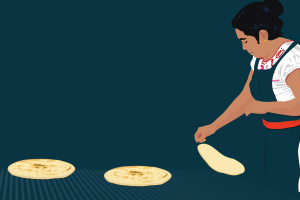Micronutrient deficiencies in Mexico: Ironing out the kinks

Executive summary
Iron deficiency and anaemia are important public health concerns in Mexico. Given the ubiquity of maize flour in the staple diet of the Mexican population – maize represents 72% of the market share for grain consumed in Mexico – flour fortification is an obvious solution to this national health crisis. Indeed, current Mexican legislation on flour fortification recommends companies use certain iron compounds to fortify flours, and the World Health Organization (WHO) sets out clear guidelines on iron sources to ensure fortification programmes are effective. However, our study shows that major brands of maize flour consumed in Mexico – including Maseca, Hari Masa and Walmart’s own brand – are not using the recommended type of iron to fortify their flour. It is very concerning that companies are choosing to ignore the recommendations when the effective fortification of flours could have a significant impact on improving people’s health. This report sets out the problem, reports on the findings of our investigation into the type of iron used to fortify flours in Mexico, and offers recommendations to the Mexican government, flour-milling industry and supermarkets to tackle this public health crisis.
PARTNERS

You might also like...

Daily Bread: Are tortillas and breads in Mexico adequately fortified?
This report explores the issue of flour fortification in Mexico, revealing that companies that make tortillas and breads are often not using flour that complies with the law.

Maizena’s missing micronutrients
This report looks at Unilever’s voluntary initiative on fortification in Mexico, and reveals a glaring lack of consistency between the company’s commitments and its business practice when it comes to fortifi...

The grain of truth: industry compliance on flour fortification in Mexico
This report calls on the new government in Mexico to take a fresh look at the actions of the food industry and take corrective action to guarantee that Mexican people have access to essential nutrients throu...